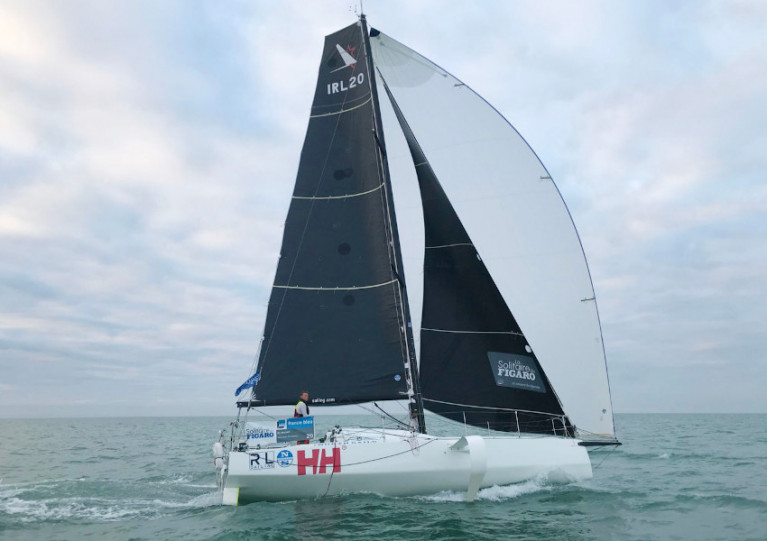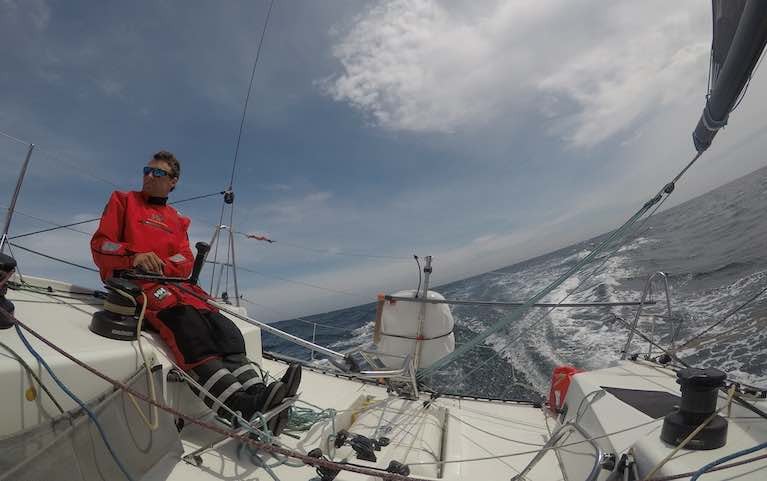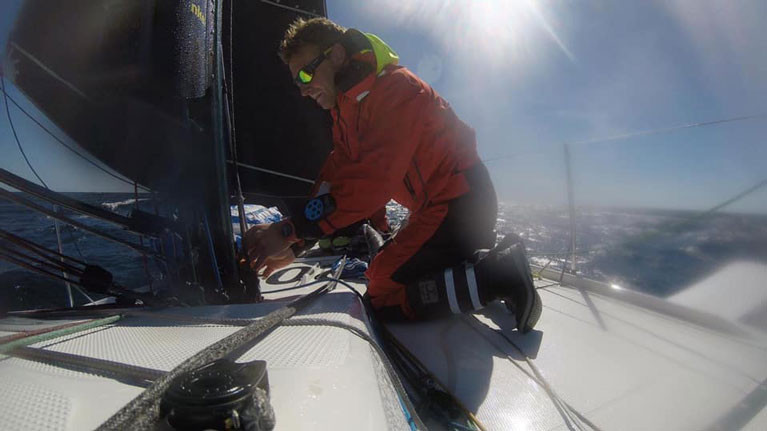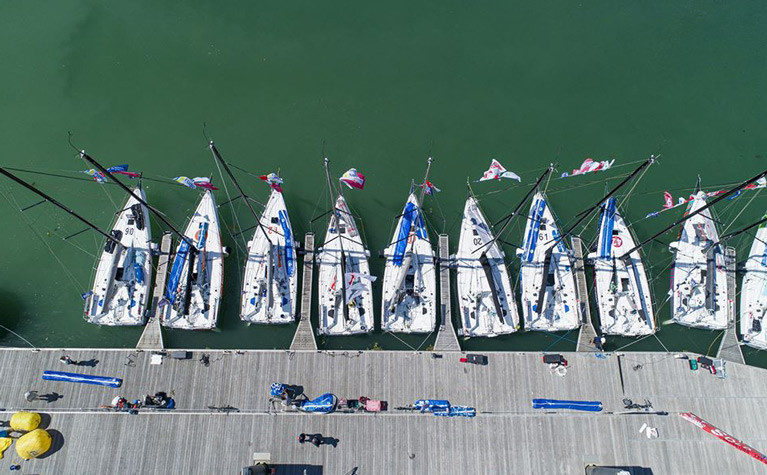Displaying items by tag: Kenny Rumball
Kenny Rumball and Pamela Lee, the mixed double-handed offshore team from Dun Laoghaire and Greystones, will be on today's Rolex Fastnet Race 2021 start line as the only Irish team competing double-handed and in the Beneteau Figaro 3 Class.
One of 11 boats with Irish interest in the race, the duo are sponsored by Hanley Energy and start with IRC 1 at 1155 BST from the famous start line set from the Flag Staff at the Royal Yacht Squadron in Cowes.
"This year looks set to be an extremely tough race, with the first few days predicted to be beating into strong wind and currents to get around Lands End before heading across the Irish Sea to the Fastnet Lighthouse. No doubt this first half of the race will put all the the crews of the 600 strong fleet to the test and certainly the double-handed, Rumball told Afloat.
This is Rumball’s fourth time competing in the 700-mile race and Lee’s second.
Rumball & Lee Review 'Gruelling' Tour De Bretagne a La Voile & Prepare for Fastnet Race
The Irish Offshore Sailing team RL Sailing, sponsored by Hanley Energy, recently completed the gruelling Tour De Bretagne a La Voile. The famous race was spread across several stages over nine days, with a combination of inshore and offshore racing in the one design Beneteau Figaro 3 fleet.
RL Sailing finished with a final 24th place in the overall series and 5th in the mixed teams. The race was an opportunity for the team to learn and progress in their first season of racing doublehanded in the circuit. The intense racing that included coastal races from port to port as well as inshore and offshore battles, provided the perfect environment to test speed, tactics and manoeuvres against a closely packed fleet. The event also brought in aspects of small boat racing as every start line hotly contested with plenty of general recalls and a huge significance placed on the first upwind leg.
“This event was much more intense than we ever previously thought it would be. It really challenges you as a sailor on every level. The format of short intense races really pushed the fleet and no race was ever over. Every place and position were hard fought!” Said skipper Kenneth Rumball.
 Close racing in the Tour De Bretagne a La Voile
Close racing in the Tour De Bretagne a La Voile
 Kenny Rumball and Pamela Lee“The shorter legs in this race meant we had more opportunity for post-race discussion and analysis and the chance to try different things the next day. Our goal for this race was to learn and improve as much as possible and with the support of Hanley Energy we certainly achieved that.” continues Skipper Pamela Lee.
Kenny Rumball and Pamela Lee“The shorter legs in this race meant we had more opportunity for post-race discussion and analysis and the chance to try different things the next day. Our goal for this race was to learn and improve as much as possible and with the support of Hanley Energy we certainly achieved that.” continues Skipper Pamela Lee.
For RL Sailing, the Tour De Bretagne was the team’s second Figaro 3 doublehanded race having competed in the Sardinha Cup in April this year. Both races have been a completely different format and challenge, with the Sardinha Cup including a stage over 500 nautical miles and lasting five days. The next and final race on the 2021 calendar for the team is the Rolex Fastnet Cherbourg. The Figaro fleet is racing in its own class within the race, and it will once again be a completely different challenge for the team as the one-design boats will be mixed in with the larger fleet of over 500 boats from all over the world. The complexities for a bigger fleet and a one-design race within it, as well as very different sailing conditions across the Irish Sea, will make for an exciting and challenging race.
“I’m really looking forward to the next challenge of the Fastnet, it’s going to be a great opportunity to get stuck into some complex navigation and continue learning and improving, and of course representing Ireland in doublehanded offshore racing,” comments skipper Pamela Lee.
Beyond Paris 2024, Irish Mixed Offshore Duo Kenny Rumball & Pamela Lee Give Their Reaction to IOC Volte Face
As World Sailing looks for alternatives for its Mixed Offshore Keelboat for Paris 2024, fledgeling mixed Irish pairing Kenny Rumball and Pamela Lee, who are campaigning in France this season, are taking the disappointment in their stride. The Dun Laoghaire and Greystones pairing believe Irish sailors have a lot more to look forward to in the international offshore sailing discipline other than the Olympics.
Here, in a statement for Afloat, 'RL Sailing', give their reaction and set out campaign plans beyond Paris 2024.
RL Sailing Continue with Offshore Sailing Plans
RL Sailing's reaction to the current uncertainty of the mixed double-handed class for Paris 2024 is to continue with overarching offshore sailing goals.
RL Sailing, the double-handed offshore sailing partnership of Dun Laoghaire's Kenneth Rumball and Greystones' Pamela Lee are the only team that have in 2021 been actively training and campaigning towards qualification to represent Ireland in the mixed double-handed keelboat class at the Paris 2024 Olympic Championships.
 RL Sailing from Ireland competing in the 2021 Sardinha Cup
RL Sailing from Ireland competing in the 2021 Sardinha Cup
Kenneth Rumball and Pamela Lee of RL Sailing have been competing and training in France in the Figaro 3 circuit. RL Sailing chose to compete and train in France as the standard and professionalism of shorthanded sailing especially in the Figaro class is unmatched anywhere in the world. This had been done at great personal and professional expense of the sailors and also their sponsors. Their campaign to date has been manifested through the hard work and dedication of the sailors, despite the obvious difficulties of the last year. Although Olympic qualification was the initial motivation that formed the team, their overarching sailing goals have always been to learn, to improve, to compete at the highest level of offshore sailing and to represent Ireland in doing so. The team's participation in the French offshore sailing circuit has already contributed to all of these goals and will continue doing so as they go on to complete their 2021 doublehanded season with the 'Tour De Bretagne De Voile' and 'The Rolex Fastnet.'
That said, RL Sailing's project aims were never solely focused on competing and representing Ireland for the Paris 2024 Olympics. The team's goals are far broader, and they will continue to work towards achieving them through their ongoing campaign.
These include:
- To be the catalyst for increased female participation within Irish Offshore Racing.
- To create opportunities for aspiring offshore sailors and to increase public engagement within Ireland.
- To capitalize on Offshore sailing's unique potential to attract a greater public audience due to the human, adventure and 24-hour live streaming elements.
- To grow Ireland's participation, support and engagement with Offshore Sailing.
- To create pathways, inspiration and opportunities for aspiring female & male sailors in Ireland.
- To mandate change for gender equality and greater inclusion within sport and leadership in Ireland.
- To compete at the top level of international ocean racing.
"The Olympics provided a clear pathway to work towards achieving our goals, something that is not always the case in competitive ocean racing. It also provided great potential to open the sport up to the broader public and engage with a wider audience internationally. However, our sport is very diverse, and there are many more avenues, opportunities and races to pursue, and the growth of the double-handed offshore circuit internationally is very exciting." – says the team.
 Pamela Lee - "I didn't start Ocean racing because I wanted to go to the Olympics - I do it because I love it!"
Pamela Lee - "I didn't start Ocean racing because I wanted to go to the Olympics - I do it because I love it!"
"I didn't start Ocean racing because I wanted to go to the Olympics - I do it because I love it! The Olympics was an awesome goal to work towards and a great opportunity to open our sport up to broader participation and great equality, but I have plenty of other big ocean racing goals to shoot for, and everything we've done as RL Sailing so far has contributed to that," says Pamela Lee
 Kenny Rumball - "my shorthanded offshore sailing experience in France has completely broadened my horizons"
Kenny Rumball - "my shorthanded offshore sailing experience in France has completely broadened my horizons"
"Although I've done a considerable amount of Offshore racing abroad, our shorthanded offshore sailing experience in France with a view to the Olympics had completely broadened my horizons on more challenging and demanding offshore sailing. I would like to continue challenging myself in this way and also to help more young Irish sailors to do the same, says Skipper Kenneth Rumball.
RL Sailing has many projects and campaign goals that they hope to launch and capitalise on in the very near future. The team are keen to hear from persons or parties that would endeavour to work with them to obtain the goals of their project.
Kenny Rumball and Pamela Lee
The doublehanded offshore Racing team of Kenny Rumball and Pamela Lee embark on the second leg of the Sardinha Cup this evening.
It's a gruelling 775 miler that immediately follows yesterday's conclusion of a 300-mile first leg in which the Dun Laoghaire Harbour debutantes finished 20th from 21.
The Rumball and Lee partnership is campaigning to be the first team to represent Ireland in the new double-handed mixed offshore sailing category in the Paris Olympics 2024.
After 1 day 13 hours and 52 minutes at sea, Team SNEF won Friday morning at 6 a.m. the Naomis Trophy (subject to Protest), the first stage of the Sardinha Cup (300 miles).
Xavier Macaire and Morgan Lagravière, led the race almost from start to finish, resisting pressure from Normandy's (Alexis Loison/Guillaume Pirouelle) and Brittany CMB Performance (Tom Laperche/Loïs Berrehar), who complete the podium.
More here
Kenny Rumball & Pamela Lee Set the Scene for Irish Offshore Sailors with North Sails Set-up
Rookie Kenny Rumball competed in his Figaro debut this autumn, reaching as high as 15th in the third stage in the notoriously tough French solo marathon event that saw the Dubliner end up 33rd from 35 starters overall.
It marked the first big challenge of his and his co-skipper Pamela Lee's campaign for a spot in the new Olympic mixed double-handed offshore event currently set to debut at Paris 2024.
But also key to their ambitions is their sail wardrobe, and Rumball and Lee enlisted the help of Nigel Young and his team at North Sails Ireland to see them right.
“With our training schedule, I didn’t want to buy sails and then go back and ask for things to be changed,” INSS head Rumball tells North Sails. “I wanted sails that worked would be fast and long-lasting. Nigel Young was my first call to make that happen.”
The pair’s full 3Di set-up got its first proper workout in this year’s La Solitaire du Figaro — one of the few major sailing events that managed to run safely amid the continuing Covid-19 upheaval.
And more recently, Lee took out the Beneteau Figaro 3 with Catherine Hunt and set a new WSSR-recognised round Ireland double-handed world record, demonstrating the powerful combination of skilled sailors, boat and sails.
North Sails has more on the story HERE.
'Nervous' Irish Rookie Kenny Rumball Embarks on La Solitaire du Figaro Challenge This Sunday
Ireland’s Kenneth Rumball is in the final preparation stages before starting his first La Solitaire du Figaro which start this Sunday, 30th August in the Bay of Saint-Brieuc. Having made the twenty-four-hour delivery up from Port-La-Foret on Sunday, Rumball’s Team RL Beneteau Figaro 3 is docked with the rest of the fleet in the marina at Saint-Quay Portrieux while any last preparations are made.
“This is my first season racing in the Figaro 3 and on courses around this section of the French coast, with all the changing schedules and restrictions due to COVID 19 I haven’t had the opportunity to do much training so I’ve found it really beneficial to do the deliveries to the race starts myself. It gives me a chance to spend real time on the water and to familiarise myself with some of the navigation in the race areas,” says Rumball.
Dun Laoghaire Harbour's Rumball was a latecomer to the Figaro 3 circuit this year, originally intending to campaign doublehanded with Irish Co-skipper Pamela Lee with the aim of representing Ireland in the first Doublehanded Offshore Worlds, which were scheduled for October in Malta. When the Worlds and the majority of the rest of the planned schedule were cancelled, Rumball quickly made the ambitious decision to take on a solo campaign for the season, culminating in Le Solitaire du Figaro.
 Kenny Rumball will be racing around the Fastnet Rock next week in the first leg of the 2020 La Solitaire du Figaro Photo: Alex Courcoux
Kenny Rumball will be racing around the Fastnet Rock next week in the first leg of the 2020 La Solitaire du Figaro Photo: Alex Courcoux
“It’s very clear that the best way to get better at shorthand sailing is to compete in France with the French. The Figaro circuit is incredibly competitive with the best shorthand sailors taking part every year, the Solitaire is the pinnacle of this circuit and a great challenge as a sailor. My main goal this year is to learn as much as possible and the learning curve has certainly been steep!” says Rumball.
"We are still on the vertical climb of this learning curve!"
So far Rumball has raced in the Solo Maitre-Coq from Les Sables D’olonne, the Dhream Cup (doublehanded) from Cherbourg-en-contentin and the Solo Guy Cotton from Concarneau. The Solo Guy Cotton was the last lead up race before the Solitaire and was a final opportunity to really focus on addressing a number of speed deficiencies, to test the new North Sails wardrobe, as well as experiment with managing sleep while racing – one of the biggest challenges. It proved to be a tough race with very fluky, light wind conditions. “Although disappointed with the final result, I took a lot of positives - good speed, smart decision making, good boat handling and above all strong mental power,” said Rumball of the race.
Now in the final days before the beginning of the first Solitaire leg, which is a 642-mile course to the Fastnet and back, Rumball is focusing on ironing out any last issues onboard, familiarising himself with the course and the navigation as well as analysing the upcoming weather and tidal patterns. Of course, a vital part of the pre-race preparation is mental and physical too, so there’s a strong focus on rest, eating well and exercise with an effort to be in a focused headspace on Sunday. “I’m certainly nervous,” says Rumball, “This is a long leg and a long time to be intensely racing with potentially some adverse weather coming through! So far the experience here in France has been great with all the other Skippers being extremely helpful and welcoming. This racing is tough, but that is exactly why we are here. We are still on the vertical climb of this learning curve!”
Irish Solo Sailors Rumball & Dolan Set for Today's Solo Concarneau Race (Tracker Here!)
Irish solo sailors Kenneth Rumball and Tom Dolan are both looking for the advantage in this afternoon’s Solo Concarneau race, the final warm-up event before the 1830 miles, four-stage La Solitaire du Figaro which takes place at the end of this month.
Rumball is a Figaro rookie and among six novices into this year’s race. Today’s 270-miler represents the Dubliner's third event in the foiling Figaro3. A full list of the 32 entries is here
Similar to the Drheam Cup start a fortnight ago, light winds are expected around the 1500hrs start time and are likely to prevail at least through the first part of the race.
Dolan, has given some predictions for the Solo Concarneau and claims to have a new magic race strategy, read more here
Hervé Gautier (Race Director) has detailed the conditions of the course: "We launch them on course 3, the 270 nautical mile route that takes them to the Green Stones to go down to the buoy of South Guérande. The first part of the course will definitely be pretty soft, with less than 5 knots expected on the starting area and the first evening. After Penmarch passes, a thermal wind will settle down. The descent to Yeu Island will be fast on the other hand in a 15-20 knot flow at reaching in a fast northeast flow. This will be established until arrival, scheduled for early afternoon Saturday. "
The race will feature Yellow brick trackers with 30-minute updates below. Expect more on the race Facebook page here
Solo Concarneau 2020 Yellowbrick Tracker
Light Winds for Rumball v Dolan in Today's Solo Maître CoQ Offshore Race (Tracker Here!)
Lunchtime today effectively sees the first Irish battle on the long road to the Paris Olympic Games 2024 as two embryonic campaigns go head to head in the offshore keelboat discipline, in the French season opener, the Solo Maître CoQ.
Both Kenny Rumball and Tom Dolan are embarking on a journey for the single Olympic place in the new mixed offshore keelboat class that will ultimately see them sail double-handed with a female teammate but for now racing this season is on a solo basis, starting today.
Racing over a varied 340-mile course the rival Irish will compete against a high-quality field of competitors, it is an ideal warmup for the main objective of the season: the Solitaire du Figaro from 25 August-20 September.
"We're docked up in Les Sabes D'Olonne, the course is plotted, it's all happening...." declared the rookie Rumball on social media who has completed just a month's training in his new boat on Dublin Bay in June, as Afloat reported here.
The race starts and finishes in the legendary French port of Les Sables d'Olonne and takes the 30 solo skippers up and down the French Atlantic coast in what promise to be light and fickle breezes.
Last year's event comprised two shorter races and one long offshore but this year the race, which has been rescheduled from its original mid-March date, spans the coastline between Belle Ile in the north, level with Nantes, and at the southernmost extremity, the Ile de Ré off La Rochelle of what looks set to be a mainly reaching course.
County Meath solo racer Tom Dolan will also get his 2020 racing season underway.
"It has been a year since I have raced solo but even though I, like everyone else in this sport, have not been able to train on the water much I feel well prepared and itching to go. I spent time during lockdown reading and re-reading the key weather texts and doing on-line courses. I have worked hard on the mental side of my approach as well as doing all I could to bolster my obvious weakness, starting." Dolan explains, "So I feel ready to go. I do believe I have a better, more mature outlook which i hope will serve me well in this second season in the Figaro 3."
At 1300hrs local time Thursday racing starts offshore of the famous town which hosts the Vendée Globe solo round the world race and it should finish Saturday morning or early afternoon.
"It looks like it will be light, tactical sea breezes a lot of the time with some very light spells. To be honest, right now the start time looks very, very light. But I think it will be essential to get away with the first pack and not be left behind if you are to have a good chance."
Dolan is looking for a good race to kick off the truncated season but will not over-pressurise himself. The big goal is to be competitive for September's La Solitaire du Figaro. In essence, this course is very much a Solitaire dress rehearsal in terms of length and duration but the pinnacle event this year is mainly in the Channel, finishing into Saint Nazaire at the entrance to the Loire estuary.
"I have worked on my decision making processes and most particularly minimising how a small mistake can lead to a downwards spiral, making more mistakes because you increase your risks and make rash decisions to try and make your losses back. Far better to stay patient and maintain a solid work rate and wait for others to make mistakes. This game proves the sailors who make the fewest mistakes win," Dolan concludes.
Dolan says he is keen to represent his home nation in the mixed offshore discipline at the 2024 Olympics and is keeping an eye on what other sailors from Ireland and from different countries are doing.

































































